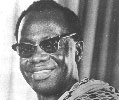Related Research Articles

Kofi Abrefa Busia was a Ghanaian political leader and academic who was Prime Minister of Ghana from 1969 to 1972. As a nationalist leader and prime minister,he helped to restore civilian government to the country following military rule.

The prime minister of Ghana was the head of government of Ghana from 1957 to 1960 and again from 1969 to 1972.

The National Liberation Council (NLC) led the Ghanaian government from 24 February 1966 to 1 October 1969. The body emerged from a coup d'état against the Nkrumah government carried out jointly by the Ghana Police Service and Ghana Armed Forces with collaboration from the Ghana Civil Service.
Simon Diedong Dombo (1925–1998) was a Ghanaian politician,teacher and chief. He was a Member of Parliament that represented Jirapa-Lambussie District in the first Parliament of the first and second Republic of Ghana.

Robert Kweku Atta Gardiner was a Ghanaian civil servant,university professor,and economist who served as the Executive Secretary of the United Nations Economic Commission for Africa from January 1962 until October 1975,and as the Commissioner for Economic Planning of Ghana from October 1975 until May 1978.
Jonathan Kwesi Lamptey was a Ghanaian politician. He was a senior figure in the CPP who later joined the opposition,subsequently playing leading roles in the government of the second republic.
Samuel Wilberforce Awuku-Darko was a Ghanaian accountant and politician. He was a minister of state,serving in the capacity as Minister of Works in the Second Republic of Ghana. He also served as the President of the Institute of Chartered Accountants from 1967 to 1969. In 2018,they noted that he had died.
Augustine Kwame Adu also known as Augustine Kwame Adu Amankwah was a Ghanaian academic,politician,diplomat and lawyer. He taught in various schools earlier in his career. He served as the Regional Chief Executive of the Eastern Region and Ghana's ambassador to Mexico. He ventured into law later in his career.
Joseph Yaw Manu was a Ghanaian civil servant and politician of the First Parliament of the Second Republic representing the Mampong South Constituency in the Ashanti Region of Ghana. He was a deputy minister for transport during the second republic.
Alexander Apeatu Aboagye da Costa was a Ghanaian lawyer and politician. He was the deputy minister for Youth and Rural Development,and deputy minister for Labour and Co-operative during the second republic
Joseph Godson Amamoo is a Ghanaian former journalist,academic,foreign service worker,and politician. He once served as editor for the Ghanaian Times,a lecturer,Ghana's ambassador to Hungary and also as a deputy minister for Health,and later deputy minister of Lands and Minerals Resource in the Second Republic.
John Kofi Fynn was a Ghanaian academic and politician. He was an emeritus professor of history at the University of Ghana and a deputy minister of state in the Busia government. He served as deputy minister for local government and administration and later deputy minister for education.
Justice Akuamoa Boateng was a Ghanaian civil servant and politician. He served as a deputy minister of state in the second republic.
George Adjei Osekre was a Ghanaian lawyer and politician. He was a barrister-at-law,a member of parliament for the Kpeshie constituency during the second republic and Ghana's ambassador to Egypt from 1980 to 1981. He was Executive Chairman of Accra Hearts of Oak S.C. from 1971 to 1975.
Kofi Badu was a Ghanaian politician and journalist. He served as a member of parliament during Ghana's first republic and a minister of state during the Supreme Military Council (SMC) era and the Armed Forces Revolutionary Council (AFRC) era. As a journalist,he was editor for various newspapers.
Joseph Leo Seko Abbey was a Ghanaian economist,politician and diplomat. He served as Ghana's Commissioner for Economic Planning from 1978 to 1979. He was Ghana High Commissioner to Canada from 1984 to 1986,Ghana High Commissioner to the United Kingdom from 1986 to 1990,and Ghana Ambassador to the United States of America from 1990 to 1994.
Timothy Amihere Mensah is a Ghanaian politician and member of the first parliament of the second republic of Ghana representing Nzema East Constituency under the membership of the People's Action Party (PAP).
Benard Kwaku Mensah was a Ghanaian politician and member of the first parliament of the second republic of Ghana representing Krachi Constituency under the membership of the Progress Party (PP).

The Political history of Ghana recounts the history of varying political systems that existed in Ghana during pre-colonial times,the colonial era and after independence. Pre-colonial Ghana was made up of several states and ethnic groups whose political system was categorized by 3 main administrative models;Centralized,Non-centralized and Theocratic states. In the colonial era,the British Empire employed different forms of government among its four territorial possessions in the Gold Coast. Indirect rule was implemented in the late 19th century after its success in Northern Nigeria. From the 1940s,native Ghanaians yearned for more autonomy. This resulted in the several constitutional reforms as well as the creation of the office of the Prime Minister in 1952.
References
- ↑ Ghana (1971). Executive Instruments. Ghana Publishing Company.
- ↑ Ghana Year Book. Graphic Corporation. 1971.
- ↑ Report of the Commission of Enquiry Into the Operations of the Office of Business Promotion and the Small Business Loans Scheme. Ghana Publishing Corporation, Print. Division. 1974.
- ↑ Division, Ghana Ministry of Local Government Information (1970). Local Government Yearbook.
- ↑ Ghana News. Embassy of Ghana. 1969.
- ↑ Africa Diary. M. Chhabra. 1973.
- ↑ Coast, Gold (1955). Gold Coast Gazette.